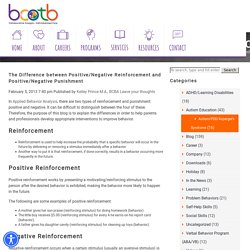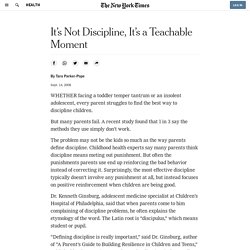

Skinner (1904 - 1990), in operant conditioning, the consequences of behaviour, such as rewards and punishments will influence the probability of a repeated behaviour.
The reinforcement and punishment principles allow parents to gain control over their child’s behaviour and see an increase in positive desired behaviours and a decrease in negative behaviours.
Here are some of the ways parents can explore to shape the behaviours of their teenage children.
Reinforcement vs Punishment. Learning: Negative Reinforcement vs. Punishment.
The Difference between Positive/Negative Reinforcement and Positive/Negative Punishment. February 5, 2013 7:40 pm Published by Kelley Prince M.A., BCBA In Applied Behavior Analysis, there are two types of reinforcement and punishment: positive and negative.

It can be difficult to distinguish between the four of these. Therefore, the purpose of this blog is to explain the differences in order to help parents and professionals develop appropriate interventions to improve behavior. Reinforcement Reinforcement is used to help increase the probability that a specific behavior will occur in the future by delivering or removing a stimulus immediately after a behavior.Another way to put it is that reinforcement, if done correctly, results in a behavior occurring more frequently in the future. Positive Reinforcement Positive reinforcement works by presenting a motivating/reinforcing stimulus to the person after the desired behavior is exhibited, making the behavior more likely to happen in the future.
The following are some examples of positive reinforcement: MSU Study: Positive vs. Negative Reinforcement in Parenting. PSYC 315 - The Effects of Positive Reinforcement Vs. Negative Reinforcement on Children. Teen brains may have an advantage — better learning. Teens can get a bad rap for their behavior.

They tend to be more sensitive to rewards than to punishments. Indeed, teens tend to seek out rewards more than do adults or young kids. Those reward-seeking behaviors can cause nightmares for the adults in their lives. But a teen’s big interest in rewards might have an upside, a new study finds. Teens may tap it to learn some new things better than adults do. The adolescent brain has a lot going on, notes Juliet Davidow. In a teen’s body, the hands and feet may grow bigger first, leaving the rest of the body to catch up. Positive Reinforcement - Tips for teaching and parenting. Teens May Learn Best with Positive Reinforcement.
A new study finds that adolescents focus on rewards and are less able to learn to avoid punishment or consider the consequences of alternative actions.

University College-London investigators compared how adolescents and adults learn to make choices based on the available information. Investigators tracked the way in which 18 volunteers aged 12-17 and 20 volunteers aged 18-32 completed tasks in which they had to choose between abstract symbols. Each symbol was consistently associated with a fixed chance of a reward, punishment, or no outcome.
As the trial progressed, participants learned which symbols were likely to lead to each outcome and adjusted their choices accordingly. Adolescents and adults were equally good at learning to choose symbols associated with reward, but adolescents were less good at avoiding symbols associated with punishment. What is Negative Reinforcement?
A first-hand account of the effects of peaceful parenting from a teen. I often get questions from parents unconvinced of the effectiveness of my parenting techniques.

Fueled by a steady diet of conventional parenting rules concerning time-outs, control, punishment, and praise, as well as personal reflections on their own childhoods, they ask questions like: “Does this stuff really work?” “How do kids learn about consequences if they aren't punished?” “Have you ever had to deal with a child having a meltdown in the middle of the grocery store?” I have a whole page on my website of letters from parents who have written heartfelt testimonials about the successful implementation of peaceful parenting. Positive and negative punishment. Does Punishment Work?
How To Instill Discipline In Teenagers. It’s Not Discipline, It’s a Teachable Moment. WHETHER facing a toddler temper tantrum or an insolent adolescent, every parent struggles to find the best way to discipline children.

But many parents fail. A recent study found that 1 in 3 say the methods they use simply don’t work. The problem may not be the kids so much as the way parents define discipline. Childhood health experts say many parents think discipline means meting out punishment. But often the punishments parents use end up reinforcing the bad behavior instead of correcting it. Dr. “Defining discipline is really important,” said Dr. But effective discipline is more difficult for busy parents because strategies that involve teaching and positive feedback take a lot more time than simple punishment, noted Dr. I Caught My Teenager Lying - What's Next? One of the hardest things we as parents face is to decide what to do when we think our teenager is lying to us.

It is hard to deal with this because our reactions are typically coloured by emotions such as betrayal and fear. Betrayal because we always thought we would have the trust of our children, and fear because we wonder if this is just the first sign that they might be involved in something dangerous or harmful. Understand Why Your Teen Might Feel the Need to Lie However, it helps to take a few steps back and try to understand the reasons behind why your child might be lying.
Understanding the reasons behind the lie will help us as parents decide what the best course of action should be. 7 Ways To Discipline Your Child.